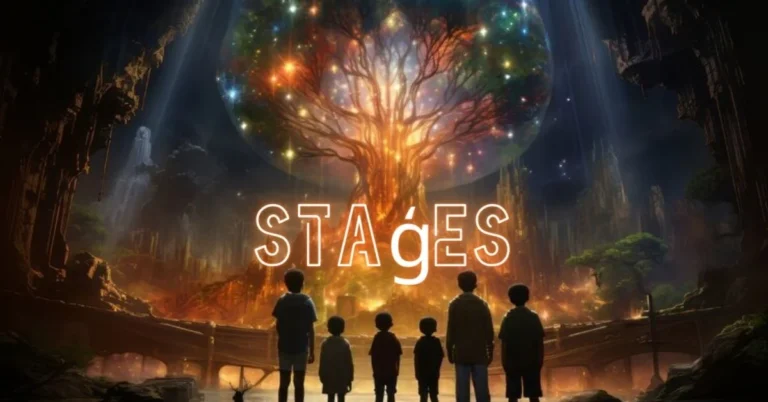Introduction to Life’s Evolution
Welcome to a journey through the intricate tapestry of life, where we unravel the different stages that shape our existence. From the innocence of birth to the wisdom of aging, life’s evolution is a remarkable odyssey filled with growth, challenges, and moments of profound reflection. Join us as we delve into the depths of each stage, exploring how they mold us into who we are today. Let’s embark on this adventure together and discover the beauty in embracing every moment of our evolution.
Stages of Life: Birth and Childhood
Embarking on the journey of life, we are welcomed into the world with cries that echo our arrival. Birth marks the beginning of our adventure, a delicate stage where every breath is a miracle.
Childhood unfolds like a tapestry woven with innocence and wonder. We navigate this stage through wide-eyed curiosity, discovering the world one small step at a time. Each experience shapes us, molding our perceptions and laying foundations for the stages to come.
Laughter fills the air as we embrace moments of pure joy, while tears teach us valuable lessons in resilience. From learning to crawl to taking those first wobbly steps, childhood is a canvas waiting to be painted with memories that will last a lifetime.
As we grow and evolve through these early stages of life, each moment becomes a stepping stone towards self-discovery and growth.
Adolescence and Young Adulthood
Adolescence and young adulthood mark a period of significant transition in life. It’s a time filled with exploration, self-discovery, and growth. This stage is characterized by hormonal changes, emotional ups and downs, and the quest for independence.
During adolescence, individuals navigate through challenges such as peer pressure, identity formation, and academic pursuits. It’s a time when priorities shift from childhood to more adult-like responsibilities. Young adulthood brings its own set of challenges as individuals step into the workforce or pursue higher education.
Relationships play a crucial role during this stage – friendships evolve, romantic interests develop, and social circles expand. Young adults grapple with finding their place in the world while balancing personal aspirations with societal expectations.
Adolescence and young adulthood are pivotal stages that shape one’s beliefs, values, and future trajectory in life.
Middle Adulthood and Personal Growth
As we journey through middle adulthood, personal growth takes center stage. This is a time of reflection, where we reassess our priorities and goals. It’s a period marked by new opportunities for self-discovery and development.
Many individuals in this stage find themselves exploring new hobbies or interests, pushing themselves out of their comfort zones. Embracing change becomes crucial as we navigate the complexities of life during this phase.
Personal relationships also evolve during middle adulthood, with deeper connections forming and old ones shifting. Communication skills improve as we learn to express ourselves more authentically.
Challenges may arise, but they are viewed as opportunities for growth rather than setbacks. We continue to learn from our experiences and adapt to the ever-changing landscape of life.
Aging and Reflection
As we journey through life, the inevitability of aging becomes more apparent. The wrinkles that etch our faces tell stories of laughter, tears, and resilience. It is a time for reflection – to ponder on the paths we’ve taken and the ones left unexplored.
With age comes wisdom; a deeper understanding of what truly matters in life. We may find ourselves cherishing moments spent with loved ones or reminiscing about past adventures that shaped us into who we are today.
As our bodies slow down, our minds become sharper in many ways. We may seek solace in quiet moments of contemplation, savoring memories like treasures held close to our hearts.
Aging can be daunting, but it also offers a chance for growth and acceptance. Embracing this stage of life allows us to appreciate each day as a gift, filled with opportunities for gratitude and self-discovery.
Coping with the End of Life
As we journey through the stages of life, we eventually come face to face with the reality of our mortality. Coping with the end of life is a deeply personal and introspective process that can evoke a wide range of emotions. It’s natural to feel fear, sadness, and even uncertainty as we contemplate saying goodbye to this world.
Some people find solace in reflecting on their accomplishments and cherishing meaningful relationships. Others may seek spiritual guidance or find comfort in nature and art. Embracing acceptance can be a powerful tool in coming to terms with the inevitable.
It’s important to remember that each person’s experience with coping with the end of life is unique. Whether it involves making peace with unresolved issues, expressing gratitude for moments of joy, or simply being present in the moment – finding ways to navigate this stage with grace is essential.
Facing our own mortality allows us to appreciate the preciousness of life and embrace each day as a gift worth savoring.
Conclusion: Embracing the Journey of Life’s Evolution
Life is a journey filled with various stages, each offering unique experiences and opportunities for growth. From the innocence of childhood to the challenges of adulthood, every phase shapes who we are and who we will become. It’s essential to embrace these stages wholeheartedly, learning from them and evolving along the way.
As we navigate through birth, adolescence, middle age, and beyond, it’s crucial to remember that life is a process of constant change and development. Each stage brings its own set of joys and struggles but facing them head-on allows us to grow stronger and wiser.
So let’s embrace the journey of life’s evolution with open arms, knowing that every twist and turn has a purpose in shaping our story. May we approach each stage with curiosity, resilience, and gratitude for all that it teaches us. Remembering that life is not about reaching a final destination but rather enjoying the ride along the way.
FAQs
1. What are the main stages of life covered in this article?
The article covers the main stages of life including birth and childhood, adolescence and young adulthood, middle adulthood and personal growth, aging and reflection, and coping with the end of life.
2. Why is childhood considered a critical stage in life’s evolution?
Childhood is considered critical because it lays the foundation for future growth. It is a time of wide-eyed curiosity and learning, where experiences shape our perceptions and build the groundwork for the stages to come.
3. How does adolescence influence personal development?
Adolescence is a period of significant transition marked by hormonal changes, emotional ups and downs, and the quest for independence. It is a time when individuals form their identity, navigate peer pressure, and shift from childhood priorities to more adult-like responsibilities, influencing their future beliefs and values.
4. What characterizes middle adulthood in terms of personal growth?
Middle adulthood is characterized by reflection and reassessment of priorities and goals. Individuals explore new hobbies, embrace change, and deepen personal relationships. Challenges are viewed as opportunities for growth, leading to continuous learning and adaptation.
5. How can one find meaning and acceptance in the aging process?
Aging offers a chance for reflection and wisdom. Cherishing moments with loved ones, reminiscing about past adventures, and seeking solace in quiet contemplation can bring meaning and acceptance. Embracing aging allows us to appreciate each day as a gift, filled with opportunities for gratitude and self-discovery.

